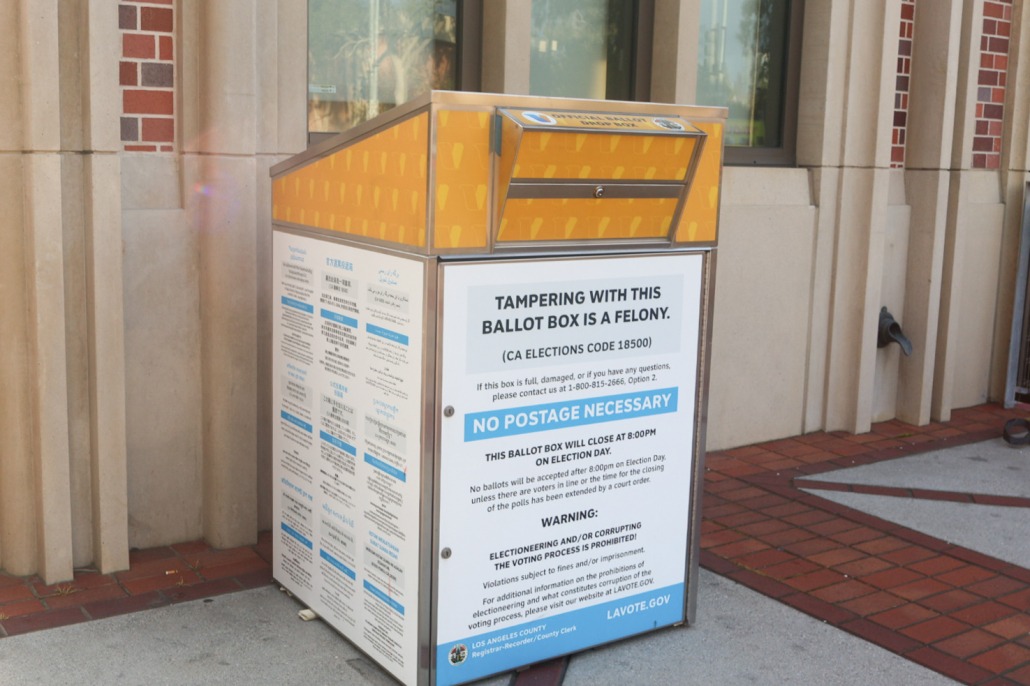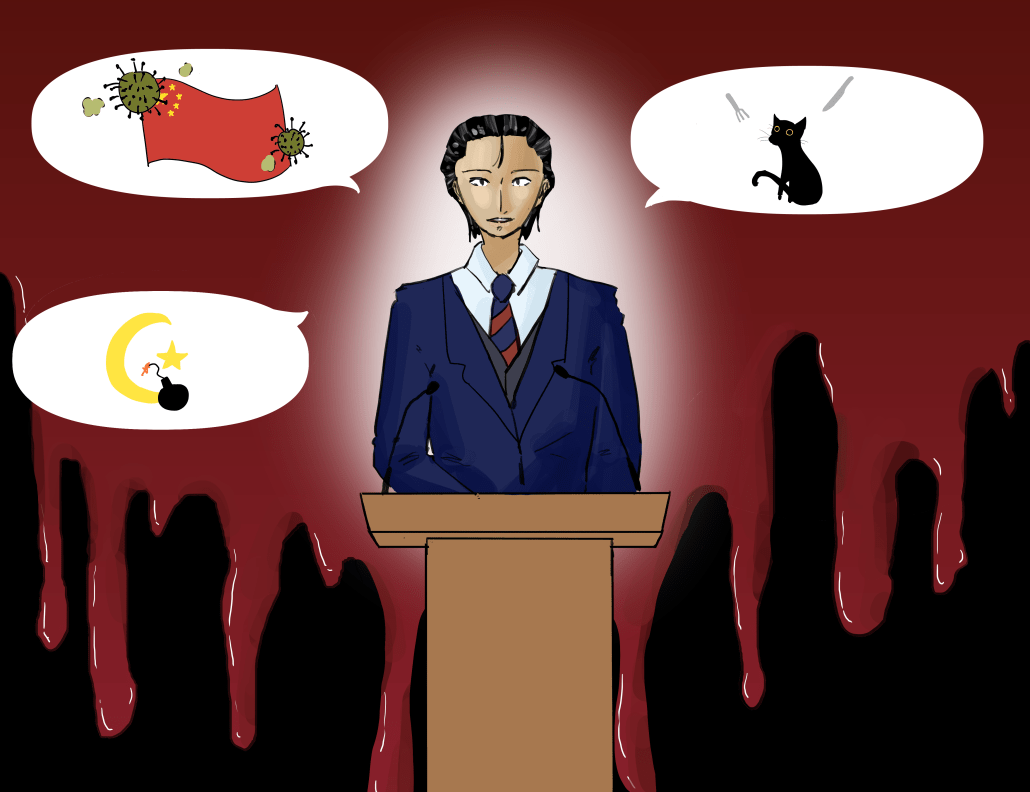Trump must be held liable as a stochastic terrorist
The former president’s dog whistles have long incited and enabled domestic terror.
The former president’s dog whistles have long incited and enabled domestic terror.

Like many of us, I am very worried about Tuesday’s election. Whether Kamala Harris or Donald Trump wins, our country will be headed in drastically different directions. With the never-ending news cycle that exists today, I often find myself confused about the reality of the country. While I have my own fears about another Trump presidency, I am equally as worried about a Harris victory — not necessarily about the actions she may take as president but more about the inevitable backlash from Trump and his supporters.
While Trump has never been one to hold back his words, I have been especially disturbed by his rhetoric since he lost the 2020 election. On Jan. 6, 2021, something that seemed impossible happened: Trump’s supporters stormed the Capitol building and delayed the certification of the election.
In the lead-up to this, Trump held a speech at the Ellipse in Washington, D.C. where he told his worried supporters, “[w]e fight like hell. And if you don’t fight like hell, you’re not going to have a country anymore.”
As his defense in court, Trump’s lawyers argued that he did not incite the Jan. 6 attacks on the Capitol because a subsequent part of his speech told supporters to march “peacefully and patriotically” to the building.
Essentially, Trump benefits from plausible deniability. The problem is that Trump started to plant seeds of doubt about the election long before the certification on Jan. 6, 2021, and even long before the election on Nov. 3, 2020.
To me, it was blatantly obvious that Trump incited his supporters to storm the Capitol, but he could very easily get away with it because his exact words did not say so.
Since then, I have wondered what to call this phenomenon as I watch Trump and his new vice presidential nominee, JD Vance, perpetuate this same doubt in other issues. Most recently, Vance has perpetrated a false claim that Haitian immigrants in Springfield, Ohio were stealing the residents’ pets and eating them. This was later parroted by Trump on the debate stage, even though Springfield officials repeatedly debunked this claim before Trump even took the stage.

(Chloe Xia / Daily Trojan
What is the direct result of this fear? Terror. As a result of the claims, more than 30 bomb threats were made to schools, government buildings and the homes of Springfield officials. It is beyond disturbing that a former president who is seeking reelection is responsible for this.
Kurt Braddock, an assistant professor of public communication at American University specializing in violence and terror, calls this phenomenon stochastic terrorism. Stochastic, in simple terms, means unpredictable: something is statistically possible and likely to happen, but it cannot be predicted with certainty.
Braddock explains in an interview with Vox that terrorism is a “very low base rate phenomenon,” and the likelihood of someone participating in it is a fraction of a fraction of a percent. However, he warns that “when you’re reaching millions and millions of people [the way Trump does], you start to approach complete likelihood that at least one person will interpret what that person said as a call to violence.”
Amid the Black Lives Matter protests in 2020, Trump tweeted “when the looting starts, the shooting starts,” and three months later, Kyle Rittenhouse — a 17-year-old Trump supporter — shot three Black Lives Matter protesters, resulting in two deaths.
I am, unfortunately, bracing for more acts of stochastic terror like this. As of last week, Trump wrote on his Truth Social account, “Pennsylvania is cheating, and getting caught, at large scale levels rarely seen before. REPORT CHEATING TO AUTHORITIES. Law Enforcement must act, NOW!” For clarification, officials have yet to find any legitimate signs of election fraud in Pennsylvania or anywhere else, let alone on a mass scale.
The direct result of the fear Trump has planted in his supporters is stochastic terror. In fact, the FBI has noted in anticipation of Tuesday’s election that “[t]hreats to election workers — including letters containing white powder, online harassment and threats … have recently increased.”
It is terrifying enough that a convicted felon is capable of running for president; it is equally as terrifying that his words have bred the political climate we exist in. Regardless of the outcome of Tuesday’s election, we can only hope that the will of American votes will be heard, not threatened. No one person should yield the power Trump wishes to, and election officials and Congress must do their part to ensure an election without interference.
We are the only independent newspaper here at USC, run at every level by students. That means we aren’t tied down by any other interests but those of readers like you: the students, faculty, staff and South Central residents that together make up the USC community.
Independence is a double-edged sword: We have a unique lens into the University’s actions and policies, and can hold powerful figures accountable when others cannot. But that also means our budget is severely limited. We’re already spread thin as we compensate the writers, photographers, artists, designers and editors whose incredible work you see in our daily paper; as we work to revamp and expand our digital presence, we now have additional staff making podcasts, videos, webpages, our first ever magazine and social media content, who are at risk of being unable to receive the support they deserve.
We are therefore indebted to readers like you, who, by supporting us, help keep our paper daily (we are the only remaining college paper on the West Coast that prints every single weekday), independent, free and widely accessible.
Please consider supporting us. Even $1 goes a long way in supporting our work; if you are able, you can also support us with monthly, or even annual, donations. Thank you.
This site uses cookies. By continuing to browse the site, you are agreeing to our use of cookies.
Accept settingsDo Not AcceptWe may request cookies to be set on your device. We use cookies to let us know when you visit our websites, how you interact with us, to enrich your user experience, and to customize your relationship with our website.
Click on the different category headings to find out more. You can also change some of your preferences. Note that blocking some types of cookies may impact your experience on our websites and the services we are able to offer.
These cookies are strictly necessary to provide you with services available through our website and to use some of its features.
Because these cookies are strictly necessary to deliver the website, refusing them will have impact how our site functions. You always can block or delete cookies by changing your browser settings and force blocking all cookies on this website. But this will always prompt you to accept/refuse cookies when revisiting our site.
We fully respect if you want to refuse cookies but to avoid asking you again and again kindly allow us to store a cookie for that. You are free to opt out any time or opt in for other cookies to get a better experience. If you refuse cookies we will remove all set cookies in our domain.
We provide you with a list of stored cookies on your computer in our domain so you can check what we stored. Due to security reasons we are not able to show or modify cookies from other domains. You can check these in your browser security settings.
These cookies collect information that is used either in aggregate form to help us understand how our website is being used or how effective our marketing campaigns are, or to help us customize our website and application for you in order to enhance your experience.
If you do not want that we track your visit to our site you can disable tracking in your browser here:
We also use different external services like Google Webfonts, Google Maps, and external Video providers. Since these providers may collect personal data like your IP address we allow you to block them here. Please be aware that this might heavily reduce the functionality and appearance of our site. Changes will take effect once you reload the page.
Google Webfont Settings:
Google Map Settings:
Google reCaptcha Settings:
Vimeo and Youtube video embeds:
The following cookies are also needed - You can choose if you want to allow them:
